Project management has rapidly evolved into one of the most essential disciplines for organizations across industries. As businesses tackle increasingly complex projects and face rising demands for speed and efficiency, the expertise of a skilled project manager has become more valuable than ever.
With over 16 million project managers worldwide, organizations are relying on project managers not only to execute tasks but to provide strategic guidance that ensures projects are delivered on time, within scope, and under budget. As a result, many project managers are finding opportunities to extend their expertise into consulting, offering services that help businesses optimize their project outcomes.
Project Management Consulting offers a unique path for project managers to transition from full-time roles to independent or side-hustle ventures. Businesses, particularly small to mid-sized ones, often lack the internal resources to manage large-scale projects or significant transformations effectively. This is where project managers can step in, providing services like Project Documentation, Risk Management & Mitigation, and Change Management Consulting.
These specialized offerings help businesses establish clear project goals, manage risks, and successfully implement change—all of which are critical to the success of any project. By providing consulting services, project managers can address these business challenges while monetizing their expertise.
For project managers looking to move into consulting, the key consideration is identifying the services they can offer based on their strengths and industry experience. Consulting can be as simple as helping businesses with project planning or more complex, such as guiding entire organizations through an Agile transformation. No matter the service, consulting allows project managers to leverage their skills in new ways, create additional income streams, and build a consulting business that aligns with their long-term professional goals.
If you are a project manager or aspiring to start your own project management consulting, here are a few creative ideas to jumpstart your business.
Project Documentation as a Service
One of the most valuable services a project manager can offer is Project Documentation as a Service (PDaaS). This involves providing businesses with comprehensive documentation that covers every phase of a project, from initiation to closeout. Key types of project documentation include project charters, scope statements, requirements documentation, risk registers, and progress reports.
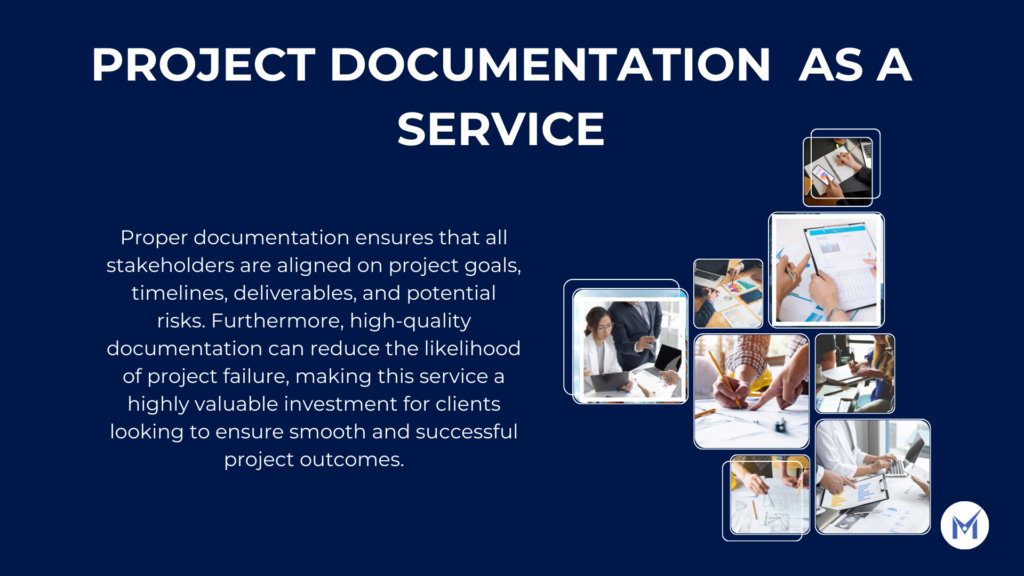
Proper documentation ensures that all stakeholders are aligned on project goals, timelines, deliverables, and potential risks. Furthermore, high-quality documentation can reduce the likelihood of project failure, making this service a highly valuable investment for clients looking to ensure smooth and successful project outcomes. By offering project documentation, project managers can help businesses maintain consistency and clarity, particularly in complex projects where multiple teams or departments are involved. The core of project documentation lies in creating detailed, accessible, and actionable documents that can guide project execution and decision-making.
For example, a Project Charter is often the first document created in a project and acts as the foundational blueprint. It outlines the project’s purpose, objectives, stakeholders, and key deliverables. By offering to draft project charters, project managers provide organizations with a clear roadmap at the outset, ensuring that everyone is on the same page. Beyond charters, project managers can also deliver detailed scope documents that outline what is—and isn’t—part of a project, helping to prevent scope creep, and requirements documentation, which provides clarity on what the final deliverables should accomplish.
As a project manager with over 16 years of experience, I’ve worked with many organizations setting up project charters for many projects. Project charter typically takes 1-3 weeks, depending on the size of the project, at a cost of anywhere $3K to $10K depending on the project’s complexity.
The key deliverables would include a complete project charter, outlining the project’s objectives, stakeholders, timelines, budget, risks, and critical success factors. A project manager would work closely with the client to gather information and ensure the charter reflects the company’s strategic goals.
This service would give businesses a solid foundation to build on, ensuring that all subsequent project decisions are guided by a well-documented plan. Offering project documentation as a service brings several benefits. First, it ensures that stakeholders have a reliable reference point throughout the project, helping to eliminate misunderstandings and miscommunications. Second, it enhances accountability—clear documentation makes it easier to track progress, assign responsibility, and measure outcomes.
Lastly, it saves time for internal teams. Many businesses, especially smaller ones, may not have the resources or expertise to generate high-quality documentation in-house. Project management service providers can fill the gap.
Project Planning as a Service
Project planning is one of the most essential services a project manager can offer as a consultant. At its core, Project Planning as a Service involves helping businesses create detailed project plans and roadmaps that guide every stage of project execution.
This service typically includes developing project milestones, defining deliverables, and setting timelines to ensure that projects are completed on time and within scope. The ability to offer clear and actionable project plans allows businesses to avoid costly delays, manage resources effectively, and maintain stakeholder alignment throughout the project lifecycle.
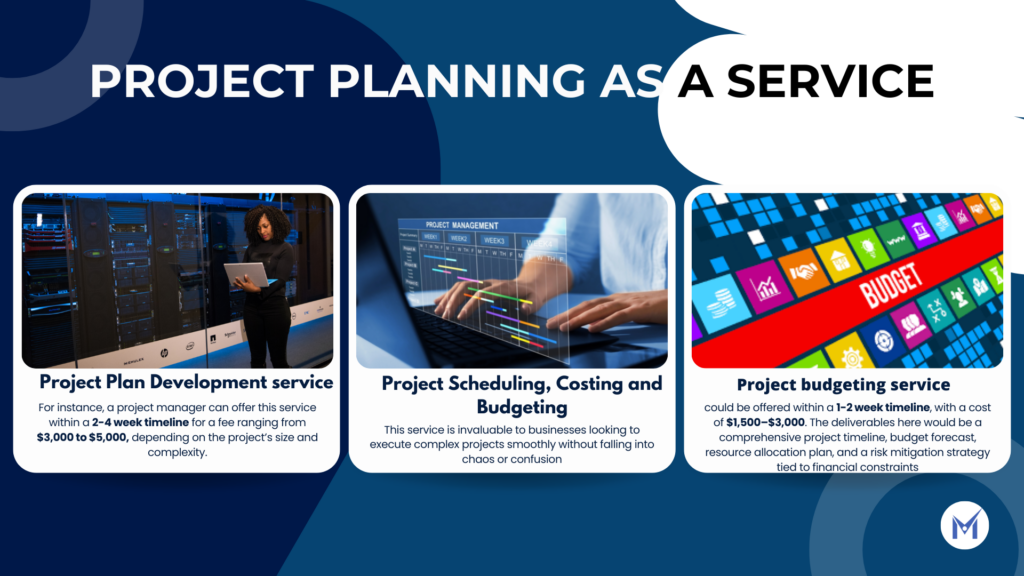
One key component of project planning is the Project Plan Development service. In this offering, project managers work with businesses to outline a comprehensive plan that includes objectives, tasks, resource allocation, risk assessments, and quality control measures. This plan serves as the backbone of the project, ensuring that all activities are structured and aligned with the business’s overall goals. For instance, a project manager can offer this service within a 2-4 week timeline for a fee ranging from $3,000 to $5,000, depending on the project’s size and complexity.
The deliverables would include a fully developed project plan document, milestone charts, and a timeline for completion. This service is invaluable to businesses looking to execute complex projects smoothly without falling into chaos or confusion. Another crucial element of project planning is Project Scheduling, Costing and Budgeting, which ensures that a project is feasible within the timeline and remains financially viable. Project managers offering this service would help businesses create accurate schedule and budget forecasts by evaluating the resources availability, cost of resources, labor, equipment, and other necessary expenses.
This service allows businesses to anticipate financial challenges and avoid schedule or budget overruns. A typical Project budgeting service could be offered within a 1-2 week timeline, with a cost of $1,500–$3,000. The deliverables here would be a comprehensive project timeline, budget forecast, resource allocation plan, and a risk mitigation strategy tied to financial constraints. Proper project schedule and budgeting not only provides businesses with cost control but also ensures that the project is financially sustainable from start to finish.
For project managers, offering these planning services opens up significant opportunities for consultancy work. Not only do they offer a chance to apply expertise in real-world projects, but they also allow project managers to position themselves as strategic partners who can help businesses avoid common project pitfalls.
Project Management as a Service
Project Management as a Service (PMaaS) is a growing consulting offering that allows businesses to outsource the management of their projects to experienced professionals. In today’s increasingly remote and distributed work environments, the demand for skilled project managers who can manage diverse teams, communicate effectively with stakeholders, and ensure project success is higher than ever.

By offering project management service, project managers can provide businesses with the expertise needed to oversee the end-to-end execution of projects, from planning to closeout, while managing the complexities of communication, resource allocation, and progress tracking.
For businesses, using expert project management consultants removes the burden of managing projects in-house, freeing up internal resources to focus on their core operations. It also allows companies to leverage external expertise in project management best practices, leading to more efficient project execution and improved outcomes. One of the core project management services is Stakeholder Communication and Engagement. A project manager offering this service would take responsibility for managing all communications between stakeholders, ensuring that expectations are aligned and any concerns are promptly addressed.
This includes setting up regular update meetings, distributing progress reports, and maintaining an open line of communication for critical project developments. This service could be delivered over the course of the project (e.g., 3 to 6 months), with a fee ranging from $5,000 to $15,000, depending on the project size and complexity. The key deliverables would include weekly status reports, communication logs, and stakeholder meeting minutes.
Another essential project management service is Project Monitoring and Control, where the project manager takes charge of tracking the project’s progress against predefined metrics and timelines. This service ensures that the project stays on track, within budget, and aligned with business goals. Through continuous monitoring, the project manager can identify risks early, make necessary adjustments, and ensure that deliverables are completed on time. For example, this service could be offered with a 1-month or ongoing engagement, priced at $3,000 to $8,000 per month depending on the project scope.
The deliverables would include performance dashboards, risk management reports, and variance analysis to measure actual progress against the planned objectives.
Project Management Tool Setup as a Service
In today’s digital work environment, project management tools like Asana, Monday.com, and Atlassian JIRA have become essential for organizing tasks, tracking progress, and fostering collaboration across teams. Providing Project Management Tool Setup as a Service allows project managers to leverage their expertise in these platforms to help businesses get the most out of their project management systems.
Many companies, particularly smaller businesses or those new to project management tools, struggle with setting up these platforms to match their unique workflows. Project managers can step in to provide a tailored setup that ensures smooth project execution from the start.
One of the key services in this offering is Tool Customization. Every business has different processes, and setting up a project management tool isn’t a one-size-fits-all solution. A project manager offering this service would work closely with a client to understand their workflows, team structure, and project goals. Based on this, the project manager can set up the tool’s boards, tasks, milestones, and reporting systems to align with the business’s specific needs.
For example, a project manager can offer an Asana setup service with a 1-2 week timeline for around $2,000 to $4,000, depending on the complexity of the setup. The deliverables would include a fully customized Asana workspace, complete with project boards, task assignments, timeline tracking, and reporting dashboards. This service helps businesses avoid the trial-and-error approach of configuring their tools and ensures they get immediate value from their investment.
Another popular tool is Atlassian JIRA, widely used in software development and Agile environments. Setting up JIRA involves more than just creating projects—it includes configuring workflows, integrating with other development tools, and setting up sprints or Kanban boards for Agile teams. Offering a JIRA Setup Service could take anywhere from 2 to 4 weeks, with a cost ranging from $3,000 to $6,000. A project manager would be responsible for creating custom workflows, defining user permissions, setting up dashboards, and integrating JIRA with tools like Confluence or Bitbucket if needed.
The key deliverables for this service would be a fully functional JIRA environment tailored to the company’s Agile processes, along with documentation and training materials to ensure the team can effectively use the platform.
The benefits of offering Project Management Tool Setup as a Service is beneficial for both clients and project managers. First, it saves businesses time and effort—they can avoid the steep learning curve and potential misconfigurations that come from trying to set up these tools in-house. Second, it ensures that businesses maximize the value of the project management platform they’ve invested in by aligning it with their unique needs and workflows.
A properly set-up tool increases team productivity, ensures better communication, and enhances project visibility, leading to more successful project outcomes. For project managers, offering this service adds a valuable layer to their consulting portfolio. It not only taps into their knowledge of project management best practices but also positions as technical experts in the platforms businesses rely on for day-to-day operations.
This service can also evolve into ongoing support or tool optimization, providing project managers with the opportunity for long-term client engagements.
Project Management Thought Leadership as a Service
In an ever-evolving business landscape, Project Management Thought Leadership as a Service allows experienced project managers to position themselves as industry experts, offering valuable insights through training, workshops, and speaking engagements.

Thought leadership involves sharing knowledge, best practices, and strategic guidance on project management, helping organizations improve their practices and drive successful project outcomes. By offering thought leadership services, project managers can expand their influence and provide organizations with fresh perspectives on project execution, risk management, Agile methodologies, and more.
One way project managers can offer thought leadership is by conducting Workshops and Training Programs for businesses or industry groups. These workshops could focus on specific areas like Agile project management, risk management, or optimizing project workflows using popular tools such as JIRA or Asana. For example, a project manager might offer a 2-day Agile Transformation Workshop at a cost of $5,000 to $8,000.
The deliverables would include hands-on training sessions, practical exercises, and takeaway materials that participants can implement in their organizations. The benefits for businesses are clear: they receive expert guidance tailored to their specific needs, helping teams quickly adopt new methodologies and enhance project outcomes. Another valuable offering is Keynote Speaking and Conference Presentations. Many organizations or industry groups host events where thought leaders are invited to speak on emerging trends in project management.
A project manager could offer a Keynote Presentation on Project Risk Management at an industry conference, focusing on how to identify and mitigate risks in complex projects. The timeline for preparing and delivering such a presentation might span a few weeks, with costs ranging from $3,000 to $10,000, depending on the event and audience size.
The deliverables would include a professionally developed presentation, insights on risk management strategies, and actionable takeaways for the audience. These types of events not only showcase the project manager’s expertise but also provide visibility and networking opportunities, helping them grow their client base.
A real-world example of project management thought leadership is Mike Cohn, one of the leading figures in Agile project management. Cohn regularly offers workshops, webinars, and training sessions on Agile best practices, Scrum methodologies, and team performance optimization.
Through his company, Mountain Goat Software, Cohn provides both in-person and online training that helps teams across industries improve their Agile adoption and project success rates. Another example is Elizabeth Harrin, a recognized project management thought leader who offers training programs, writes books, and speaks at events, sharing insights on leadership, collaboration, and effective project management.
Image Source: Moutaingoatsoftware.com
For project managers looking to break into thought leadership, platforms like LinkedIn, TEDx, and industry conferences provide excellent opportunities to build visibility. Influencers like Mike Cohn and Elizabeth Harrin are great examples of how project managers can successfully combine thought leadership with practical training services, inspiring others in the field while expanding their own businesses.
Risk Management & Mitigation as a Service
Risk Management & Mitigation as a Service is a highly valuable offering that project managers can provide to businesses looking to minimize the uncertainties that could derail their projects. Every project, regardless of its size or complexity, carries risks—be they financial, operational, or even market-related. A proactive approach to identifying, assessing, and mitigating these risks is crucial for the successful delivery of any project. Project managers can offer expertise to help businesses navigate risks with structured frameworks, ensuring that projects stay on track, within budget, and aligned with business goals.

One key service within this offering is Risk Identification & Assessment, where the project manager helps businesses uncover potential risks early in the project’s lifecycle. This service typically involves conducting thorough risk assessments, where potential risks (such as budget overruns, resource constraints, or timeline delays) are identified and ranked based on their likelihood and impact. By offering a Risk Assessment Workshop, a project manager can guide teams through identifying risks and creating a risk register, which becomes a crucial tool for tracking and monitoring risks throughout the project.
This service could be delivered within a 2-3 week timeline, at a cost of $3,000 to $6,000, with the key deliverables being a comprehensive risk register and a prioritization matrix that highlights high-impact risks for further action. Another essential service is Risk Mitigation Planning, where project managers help businesses develop strategies to reduce or eliminate the impact of identified risks. This service might include creating contingency plans, establishing trigger points, and implementing risk response strategies like risk avoidance, risk transference, or risk reduction techniques.
For example, a project manager can offer a Risk Mitigation Strategy Service over a 3-4 week period, charging $4,000 to $7,000, depending on the complexity of the project. The deliverables for this service would include a detailed mitigation plan with actions tied to each major risk, as well as clear guidelines on how to monitor and respond to risks as they materialize.
This helps ensure that when unexpected challenges arise, businesses are prepared and can respond without disrupting the entire project. For project managers, offering these services positions them as strategic partners rather than just task coordinators. By helping businesses mitigate risk, they demonstrate their value in ensuring successful project delivery, which can lead to long-term client relationships and repeat business. Moreover, with the increasing complexity of projects across industries, particularly in sectors like IT, construction, and finance, the demand for robust risk management strategies is higher than ever, making this an attractive service for project managers to offer.
Quality Management as a Service
Quality Management as a Service is a vital offering that project managers can provide to ensure that projects meet the required standards and deliverables are aligned with client expectations. Quality management covers the entire lifecycle of a project, from planning to execution, and includes processes such as quality assurance (QA), quality control (QC), and testing. By providing this service, project managers can help businesses reduce errors, improve product or service quality, and ensure that project outcomes meet both regulatory and customer standards.
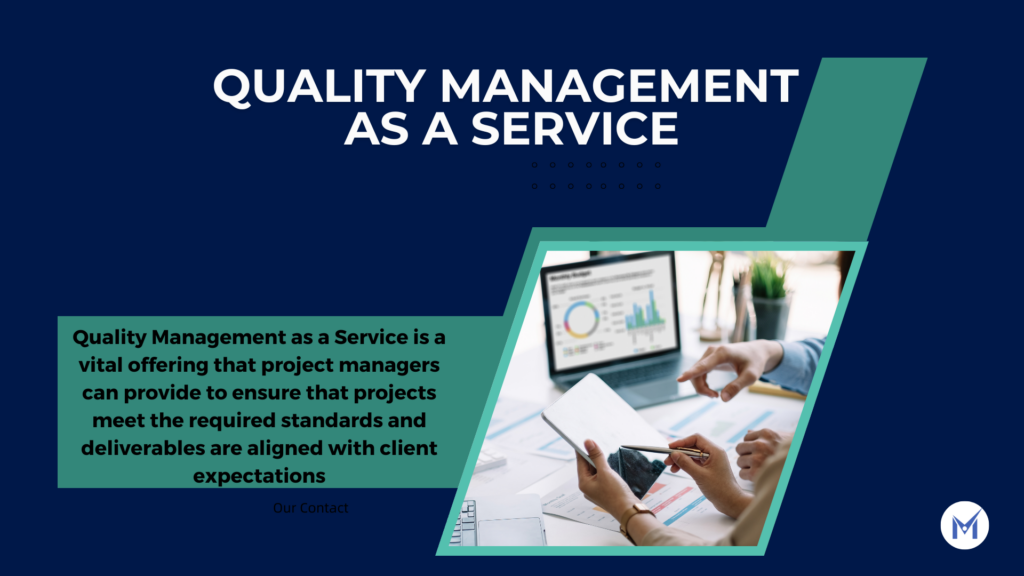
This is particularly valuable in industries where quality is paramount, such as software development, manufacturing, and construction. Project managers offering Quality Management Consulting can tailor their services to different stages of a project. For instance, during the planning phase, they can establish quality standards, metrics, and guidelines that the project must adhere to. In the execution phase, they can ensure that quality control processes are in place, such as regular inspections, audits, and testing to identify and address potential issues.
Offering Testing and QA Services during the final phases of a project ensures that the deliverables meet the set quality benchmarks before they are handed over to the client. This end-to-end approach to quality management provides businesses with a structured process to manage risk, avoid rework, and increase client satisfaction.
One of the key benefits of leveraging quality management service for clients is the ability to prevent costly project failures. Poor quality management can lead to project delays, additional expenses, and damage to a company’s reputation. By bringing in a project manager to oversee quality assurance and control, businesses can ensure that potential issues are caught early and addressed before they escalate. Another benefit is the standardization of processes. Project managers can help businesses establish repeatable quality management frameworks, which can be applied across future projects, leading to long-term efficiencies and higher quality outcomes.
For project managers, providing Quality Management as a Service opens up a range of opportunities across different industries, from tech to manufacturing. It also allows them to position themselves as problem-solvers who can improve not just the outcome of a single project but also the long-term quality of a company’s operations
For example, a project manager could offer a Software QA & Testing Service for a technology company launching a new product. This service might include creating a comprehensive testing plan, conducting unit, integration, and system testing, and ensuring that the final product meets both functional and non-functional requirements. A project manager offering this service could work with the company over a 3-month period, with a cost ranging from $10,000 to $40,000, depending on the complexity of the software and the testing requirements. Deliverables would include detailed test reports, bug tracking, and recommendations for improvements to the development process to prevent future quality issues.
Change Management Consulting as a Service
Change Management Consulting has become a critical service for businesses undergoing transformation, whether it’s a shift in technology, business processes, or organizational structure.Project managers are uniquely equipped to guide organizations through these transitions, as they are skilled at managing cross-functional teams, aligning stakeholders, and ensuring smooth project execution. As change agents, project managers can help businesses navigate the complexities of change, minimize disruption, and ensure high adoption rates across teams.

Project managers can offer change management by working with businesses to create customized change management strategies that align with their specific needs. This includes assessing the organization’s readiness for change, identifying key stakeholders, and creating communication and training plans to ensure that the entire workforce is aligned with the new direction. By using a structured approach, project managers can help businesses anticipate and mitigate resistance to change, ensuring a smoother transition and higher chances of success.
For example, during a digital transformation, project managers can ensure that employees are well-prepared and trained to adopt new technologies and processes, reducing the risk of project delays or failures due to poor implementation. An example of Change Management consulting could be a technology change management Service, where a project manager helps an organization adopt new software or technology across departments. This service might take 3 to 6 months, with a cost ranging from $15,000 to $50,000, depending on the complexity of the technology and the size of the organization.
The deliverables would include a detailed change management plan, communication materials, training programs for staff, and ongoing support during the technology rollout. The project manager would also work closely with leadership to monitor adoption rates and address any issues that arise, ensuring a successful transition. For project managers, offering Change Management opens up new avenues to demonstrate their leadership and strategic planning capabilities. By offering services that help organizations achieve high adoption rates and smooth transitions, project managers can build long-term relationships with clients and create opportunities for future consulting engagements.
Agile Transformation Consulting as a Service
In today’s rapidly changing business landscape, more organizations are shifting towards Agile methodologies to increase flexibility, respond faster to market demands, and enhance collaboration across teams. Agile transformation is no longer limited to IT or software development; it has become a strategic approach for organizations across industries. Transitioning to Agile often presents challenges, as it requires cultural shifts, changes in processes, and rethinking how teams work together.
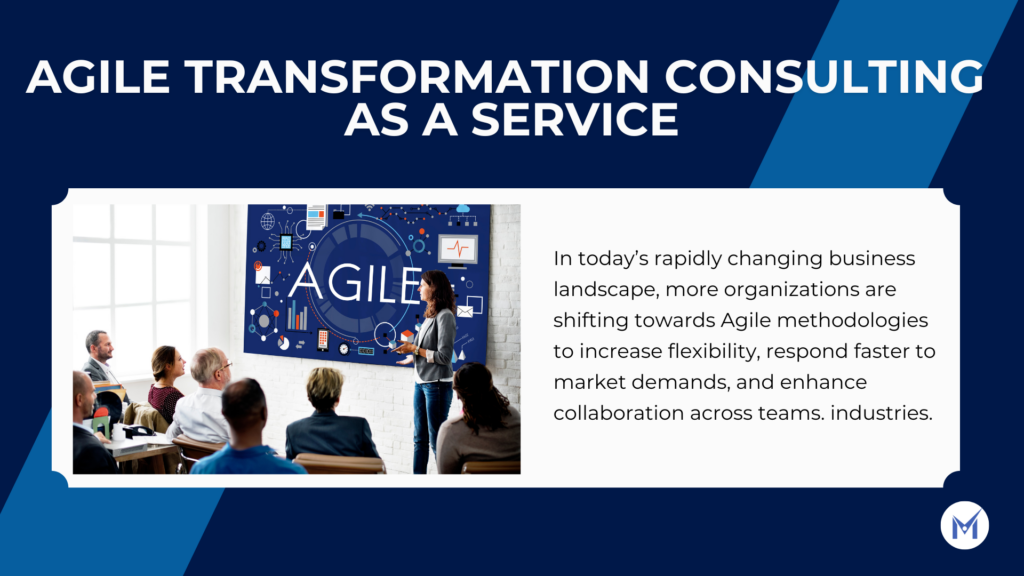
This is where Agile Transformation Consulting comes in—a service where experienced project managers help organizations transition to Agile methodologies, train teams, establish Agile processes, and optimize workflows for efficiency and effectiveness. Project managers are uniquely positioned to offer agile transformation because they have the expertise to manage large-scale changes, integrate Agile principles, and align the transformation with the organization’s strategic goals.
Project Managers can guide businesses through the transition by providing tailored training for teams, helping set up Agile tools, and ensuring that Agile processes are implemented correctly. They can also mentor leadership teams to foster a culture of collaboration and continuous improvement, which is critical for sustaining the Agile framework.
Offering this service is valuable because many organizations struggle with adoption, often misinterpreting Agile as merely a process change rather than a comprehensive cultural shift. One key benefit of Agile Transformation Consulting is its ability to significantly improve project delivery times and flexibility.
Research from the Project Management Institute (PMI) shows that organizations using Agile practices complete projects 19% faster than those relying on traditional methods. By offering this service, project managers can help businesses become more adaptive and resilient, ensuring that teams can pivot quickly in response to changing priorities or market conditions.
A real-world example of Agile transformation is Spotify’s Agile journey. The company adopted Agile frameworks such as Scrum and Kanban, but over time developed its own model, known as the Spotify model, to support its unique workflow and product development needs.
An Agile consultant could offer a similar Agile Transformation Service, which might include conducting a full organizational assessment, designing a customized Agile roadmap, and providing Agile training workshops for teams. This service could take anywhere from 3 to 6 months depending on the size of the organization, with a cost ranging from $10,000 to $50,000, depending on the scope.
The deliverables would include a tailored Agile implementation plan, training materials, ongoing support for Scrum Masters and Product Owners, and performance tracking tools to measure progress. Another example is ING Bank’s Agile transformation, where the organization transitioned from traditional banking processes to an Agile model that allowed them to reduce project turnaround times and become more customer-centric.
In this case, an Agile Transformation Consultant would work closely with business units, product owners, and senior management to help them understand Agile principles and establish cross-functional squads and tribes. The consultant could offer a 6-month Agile Transformation Program for a fee of $20,000 to $70,000, depending on the scale, with the key deliverables being a complete Agile team structure, customized workflow processes, and regular coaching sessions to ensure sustainable Agile adoption.
By offering Agile Transformation Consulting, project managers can become critical partners in helping organizations modernize their approach to project management. Not only do they help businesses gain a competitive edge, but they also empower teams to work more efficiently and adapt to change quickly. For project managers, this service allows them to offer ongoing value, as Agile transformations often require continuous monitoring and adjustments, making it a long-term engagement opportunity.
PMO Setup & Optimization as a Service
As businesses grow, the complexity of managing multiple projects increases, and many companies struggle with inconsistencies in project execution, scope creep, and inefficient resource allocation. Setting up a Project Management Office (PMO) is a critical step for companies looking to scale their operations, improve project governance, and ensure consistent project delivery. A PMO serves as a centralized hub for defining and maintaining project management standards across the organization, helping align projects with business objectives.
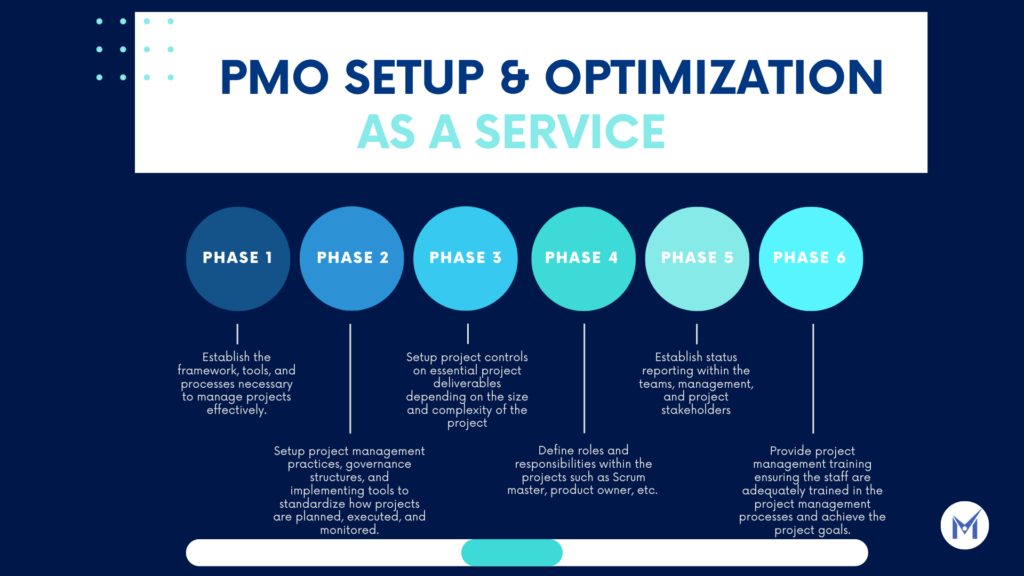
This is where project managers can offer PMO Setup & Optimization Consulting Services, providing companies with the expertise they need to build a solid foundation for managing their portfolio of projects efficiently.
I recently had an opportunity in setting up PMO for a $4B company in the Energy sector. Some of the activities are:
- Establish the framework, tools, and processes necessary to manage projects effectively.
- Setup project management practices, governance structures, and implementing tools to standardize how projects are planned, executed, and monitored.
- Setup project controls on essential project deliverables depending on the size and complexity of the project. For example, a project of size $500K or lesser would use simple project deliverables compared to multi-million dollar projects.
- Define roles and responsibilities within the projects such as Scrum master, product owner, etc.
- Establish status reporting within the teams, management, and project stakeholders
- Provide project management training ensuring the staff are adequately trained in the project management processes and achieve the project goals.
Setting up a PMO might involve a 6-month engagement. This service could cost between $25,000 and $75,000, depending on the complexity and scale of the organization. The deliverables for this service would include a complete PMO framework, standardized project templates, governance documents, and the selection and configuration of project management tools (such as Microsoft Project, Asana, or Monday.com). The project manager would also offer training sessions to ensure the internal team can effectively manage the PMO once it’s in place. This setup would provide long-term value to the business by ensuring all projects are aligned with strategic goals, improving resource allocation, and establishing clear communication channels across teams.
Summary
Project managers possess a wealth of skills that can easily be transformed into high-demand consulting services across various industries. From Project Documentation and Project Planning to more specialized offerings like Agile Transformation and Risk Management & Mitigation, project managers have a unique opportunity to leverage their expertise to help businesses optimize their project outcomes. By offering services such as PMO Setup & Optimization, Change Management, and Quality Management, project managers can provide structured solutions that improve operational efficiency, ensure smoother transitions, and enhance the overall success of projects.
Building a consulting business around these services allows project managers to turn their knowledge into a flexible and lucrative business. Project managers can start small by offering services on a freelance or part-time basis, testing the waters before committing to consulting full-time. Additionally, the ability to package these services in a way that caters to specific industries—whether in tech, construction, or finance—allows project managers to differentiate themselves in a competitive market.
Minutly helps project managers with project management service templates that you can use to quickly build and showcase your service offerings, generate interest, and build your business.



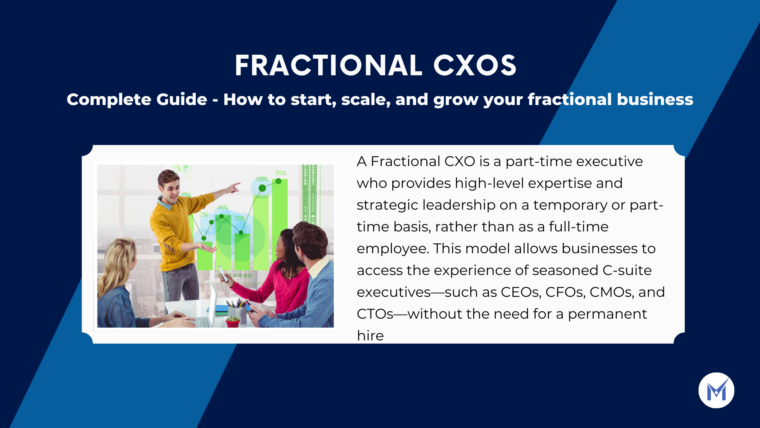
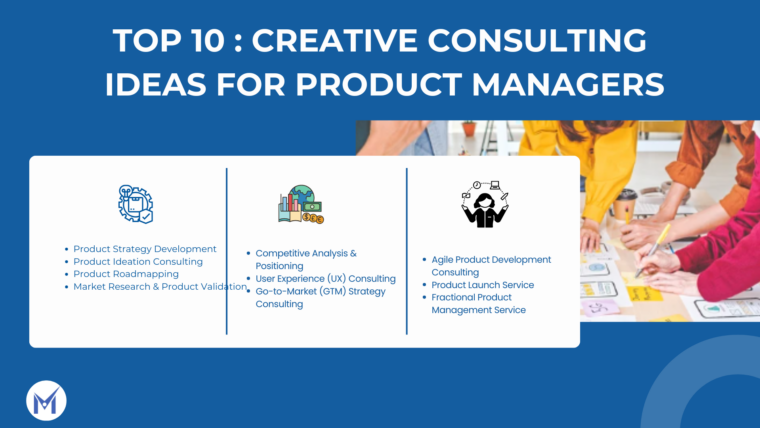


Top 10: Creative Consulting Ideas for Product Managers
Website with a purpose: Drive More Sales
How to launch your web design service – A comprehensive guide to success
50+ Website features that makes running a business easier
What is a Service Catalog?
Top 10 Essential Sales Service Requests Every Business Should Offer
Sharing your Minutly Catalog
Setting up your catalog